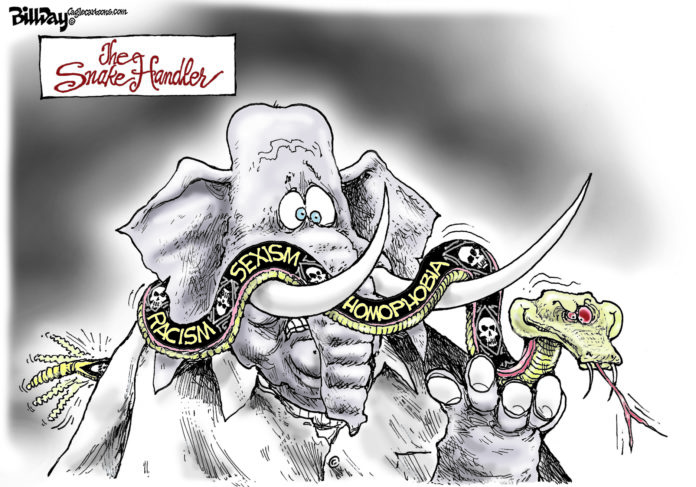BY RICHARD L. FRICKER
 Remembering Barack Obama never carried a single county in Oklahoma, and nearly every elected statewide office and legislative seat is held by Tea Party evangelicals, it is safe to assume the off-year election to be another ultra-conservative rout. But the GOP is in a family fight for control of its national soul.
Remembering Barack Obama never carried a single county in Oklahoma, and nearly every elected statewide office and legislative seat is held by Tea Party evangelicals, it is safe to assume the off-year election to be another ultra-conservative rout. But the GOP is in a family fight for control of its national soul.
Within this context, Dr. Brandon W. Lenoir, a political science professor at Oklahoma State University, has some unsettling news for the Republican rightwing. In a recent voter sampling, conservative message mongers received lower approval ratings from young Republican women than they received from Democrats. Dr. Lenoir is not alone in his findings.
Project New America President and CEO Jill Hanauer says the mainstay of the ultra-conservative movement, the southern voter, is “becoming increasingly progressive.”
Speaking by phone from her Denver office, she said young voters “don’t trust politicians.” She added, “They consider politicians out of touch.”
She offered Oklahoma state Rep. Sally Kern, R-OKC – noted for saying homosexuals were a greater threat to the republic than terrorists – and the referendum defining marriage as only between a man and woman [recently overturned by U.S. District Judge Terence Kern [no relation] as examples, saying young voters have moved well beyond the gay marriage issue.
Hanauer and Dr. Lenoir cite southern elections as examples the Tea Party movement may be losing steam. Dr. Lenoir cited last November’s Alabama congressional runoff between GOP stalwart Bradley Byrne and Tea Party candidate Dean Young.
Noting that in conservative states such as Alabama and Oklahoma the party primary winner has, in recent years, won general election, Bradley’s win signals a weakening of Tea Party appeal, according to Dr. Lenoir.
Hanauer recalled the PNA efforts in the 2011 Mississippi election to defeat the “Personhood” referendum, declaring that life begins at conception, as suggesting the ultra-conservative agenda may be on the wane.
The Personhood measure had been expected to win easily but was voted down by a 57%-42% margin.
The PNA website notes, “What we discovered through this research is that voters’ views on abortion are far more complex than the simple pro-choice/pro-life dichotomy … While voters harbor complex and often conflicting views on the issue, we found wide consensus around the idea that decisions on women’s health should be made by a woman, her family and her faith, not government bureaucrats.”
When Dr. Lenoir puts the Alabama result – due in part, he believes, to Byrne’s support from a Chamber of Commerce weary of Tea Party inflexibility – into the mix with his OSU research, the message takes on more weight.
Using a Perception Analyzer, whereby subjects register their feelings electronically on a scale of 1-100 while listening to a presentation, Dr. Lenoir asked a group of student voters to rate President Obama’s State of the Union address and the GOP response, as delivered by Washington U.S. Rep. Cathy McMorris Rodgers.
The students – 26 males and 24 females – were divided in equal groups of Democrats, Republicans and Independents.
The perception of the president’s message generally tracked along party lines, Dr. Lenoir said. Women, he noted, generally gave the State of the Union higher marks when it came to long-term goals.
But the surprise came when he evaluated the response to Rep. McMorris Rodgers. Her message, especially when she talked about family, religion and traditional values, failed completely with young Republican women.
“These findings,” he said, “indicate the ultra conservative message may be losing ground with a core of future voters.”
He believes the young Republican voter maybe headed into a generational shift where long-term goals are more important than “traditional values” as set forth by the Tea Party and evangelicals.
Hanauer agrees, noting that younger Republicans and libertarians are more business- and result-oriented than attached to a particular ideology.
“They are also concerned with issues of fairness,” she said. “Their communities are no longer isolated.”
Does this spell the end of the Tea Party or evangelical movement in the election process? Certainly not, according to the researchers.
But it does suggest the ultra-conservative movement is not as popular as it once was and that the mainstream GOP may be in the process of winning the family fight.
The research also suggests, according to Hanauer, that Democrats have a window of congressional opportunity if they concentrate on aggressively educating voters and make the most of wedge issues such as legalizing medicinal marijuana.
Asked if Democrats had been too timid delivering their message in recent elections, Hanauer said, “Voters are smart, they know when you’re scared. When you’re scared they won’t vote for you.”
She also cautioned, “2014 can not be used to predict 2016. Voters, young voters, are waiting for an issue where they can see some political passion.”
– Richard L. Fricker lives in Tulsa, OK and is a regular contributor to The Oklahoma Observer. His latest book, The Last Day of the War, is available at https://www.createspace.com/3804081 or at www.richardfricker.com.
Update 3.2.14: This essay was updated to correct the spelling of Dr. Lenoir.







